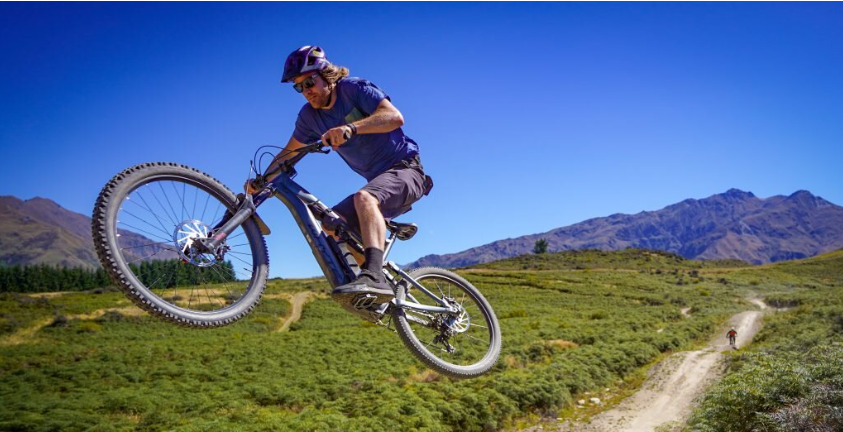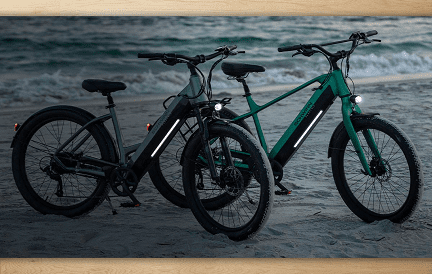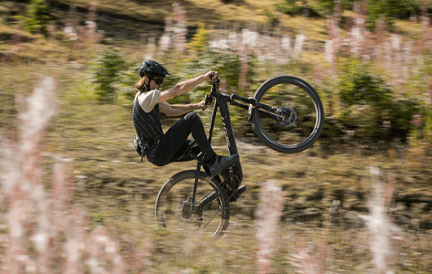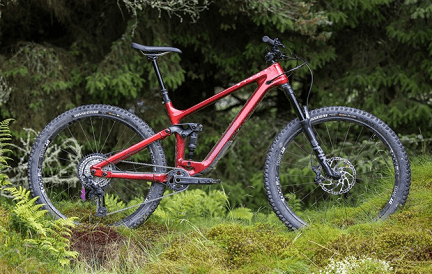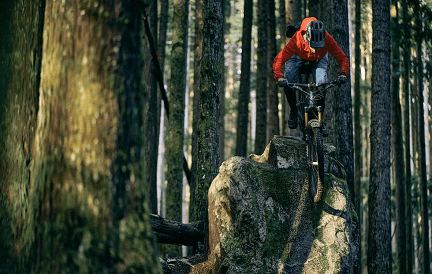26 inch bike for what size person is a familiar question in the biking community, your mountain bike wheel size can determine how comfortable you are on your bike. It is an important aspect of choosing the right bike size that would suit you and be in proportion with your body size. For those who are new to mountain biking, this is what a 26-inch bike means. “26-inch bikes are bikes with a wheel diameter of 26 inches.”
- Part 1: 26 Inch Bike for What Size Person and How to Determine Your Bike Size
- Part 2: What to Consider Before Choosing a Wheel Size
- Part 3: Picking the Right Mountain Bike Size
- Part 4: Advantages and Disadvantages of a 26 Inch Bike
- Part 5: Comparing 26 Inch Bike to Other Bike Sizes
- Part 6: Frequently Asked Questions (FAQs)
Part 1: 26 Inch Bike for What Size Person and How to Determine Your Bike Size
People between 5’0 to 5’7 will find 26-inch bike frames to be comfortable for them. It is specifically designed for people within that height range. Although 26-inch bike will fit most people’s needs, there are some situations where it wouldn’t be the right choice. For 6’2” and taller people, the 26-inch bike seats are positioned too high and may be uncomfortable. It will be best to go for a larger frame size if you are within that height range.
If you are shorter than the above height ranges, it would be best to go for a smaller frame.
26 Inch Mountain Bike for What Size Person
The 26-inch mountain bike is for people between the height range of 5’0 to 5’7 feet tall. 26-inch bike size persons between the 154 cm and 170 cm.
How to Determine Your MTB Size with a Bike Chart
Bike sizes can be determined either by rider’s height or bike and inseam length. Find out what bike sizes fit your height.
By rider’s height and bike wheel size.
Rider’s Height in feet Wheel size
5’4”-5’7” 26-inch
5’7”- 6’2” 27.5 inch
6’2” and taller 29-inch
By rider’s height, mountain bike frame size, and leg inseam length
Bike size Mountain Bike frame size Rider’s height in cm Inseam length in cm
Extra small 14-inch or less 149–154 cm 62-70 cm
Small 15-inch and/or 16-inch 154–165 cm 63-76 cm
Medium 16-inch and/or 17-inch 165–179 cm 66-78 cm
Medium 17-inch and/or 18-inch 179–182 cm 68-81 cm
Large 18-inch and/or 19-inch 182–190 cm 71-83 cm
Large
19-inch or more 190.5- 198 cm 73-86 cm
A Mountain bike frame is the best way to determine the size of your bike. Depending on your height, and inseam length, the sizing will tell how well you fit on the bike.

Part 2: What to Consider Before Choosing a Wheel Size
26in wheels have shorter spokes and smaller rim diameter, they are lighter and more responsive than the other sizes. they give aster acceleration on smooth surfaces. 26-inch bikes are stiffer, more agile, stronger, and easy to maneuver.
26 Inch Cycles for What Size Person
26in wheels are for people between 5’- 5’7 as said above.
26-inch bikes are light, but because of their smaller wheel size, they impact at a lower and steeper attack angle, causing them to rattle and rapidly lose speed.
27.5in wheels have a faster acceleration rate, and are smoother than the 26-inch wheels, but in terms of agility and stiffness, they are better than the 29-inch wheels.
29-inch bikes are great for rough terrains. They provide a smoother ride, and are more stable, because of their bigger wheel size, they impact at a shallow and higher attack angle with more acceleration causing them to move smoothly over rough terrains. The larger the wheels, the less subject it is to road imperfections.
29-inch bikes are perfect for high speed riding.
They are heavier, harder to maneuver than the 26in, and a lot less stiff.
Part 3 Picking the Right Mountain Bike Size
Here’s what you need to know in picking the right MTB size.
Wheel Size
The wheel size of your bike is a measurement of the wheels’ diameter. Mountain bikes come in three (3) wheel sizes 26-inch, 27.5 inches/ 650b, and 29-inch. The wheel size of a bike plays a very important role in choosing a suitable bike size.
Frame Size
The size of a bicycle frame must correspond with your height and body size. This is one of the first things you should look out for when choosing the right bike size for you. If the bike’s frame size doesn’t correspond with your height and body size, it will be hard for you to ride the bike.
Seat Position and Configuration
Seat position and configuration is also an important factor to consider when picking a suitable bike size. Some bike seats lean forward, some lean backward, and some are balanced. When picking a bike, be sure to choose the seat position you are most comfortable with, as different bikes have different seat configurations.
Handlebar
It is best to choose a handlebar that matches your shoulder width. Picking the wrong handlebar size can cause you to suffer back pain and sore wrists.
Inseam Length
Your inseam length is the distance from your crotch to the floor. This determines the frame size of your bike.
Top Tube Length
The top tube length is the horizontal distance between the top tube and the seat tube. It determines the length of your bike. The top tube length affects your bike’s climbing ability on steep terrains.
Comfort
When picking a bike, you should go with a choice that is comfortable for you to ride, otherwise, you may not be able to ride it as frequently as you would want to.
Part 4: Advantages and Disadvantages of a 26 Inch Bike
Here are the advantages and disadvantages of a 26-inch bike.
Advantages of 26 Inch Cycles
- Great for technical terrains
26- inch bikes are great for fast terrains that require riders to act quickly because they have smaller wheels, they are strong, responsive, and easily maneuverable. The absence of an extra rotating mass makes it easier for riders to adjust without delay. - Light weight
Because of their smaller forks and wheels, 26-inch bikes tend to weigh less than 27.5-inch and 29-inch. - Bike fitting
26-inch bikes fit a majority of riders, unlike other bike wheel sizes. - Stronger rims
26-inch wheels have stronger rims that do not deform from impact, because they have a smaller circumference. - Faster acceleration
In terms of speed, 26-inch bikes are really fast, due to their lighter wheels that makes it easier to pedal up to speed. - Less expensive
26in bikes are less expensive than other available mountain bike options, its parts are cheap and common.
Disadvantages of a 26 Inch Cycle
- Less traction
Because of their smaller wheels and smaller tire footprint, 26-inch wheel sizes have less traction than bikes with larger wheels. - Higher tire pressure
26-inch wheel sizes require a higher tire pressure than those with larger wheels. - Added suspension
Going over rough terrain with a 26-inch cycle is less forgiving, so the smaller wheels require added suspension to absorb the roughness of the terrain. - No impact absorption
With 26in wheel size, there is no impact absorption, which makes it really sensitive. While on technical terrain, you will feel every bump and rattle, which can be overwhelming especially when riding long distances. - Lower attack angle
Because of their smaller wheel size, they impact at a lower and steeper attack angle. This makes it harder to climb over obstacles.
Part 5: Comparing 26 Inch Bike to Other Bike Sizes
Find out how 26-inch bike compares to 29-inch and 27.5”/650B.
26-Inch vs 29-Inch
Here is how the 26-inch wheel size compares to the 29-inch in terms of maintaining speed, handling, geometry, size, weight, traction, climbing and strength.
If you are 6” feet and taller, a big size bike like the 29-inch is the right choice for you, it has a faster top-end speed, its bigger wheels absorb the terrain’s roughness, less suspension travel, and less pedal bod for increased efficiency, increased traction due to a larger tire footprint, great for climbing over obstacles, it is more efficient on longer rides and increased rotational weight.
The 26-inch bikes have been in existence for decades and have been the standard for most mountain bikes until the 29er came into the market around 2010. 26-inch bikes have their advantages and disadvantage
Maintaining Speed
When it comes to maintaining speed, the 29-inch bikes are better, which may be because they have an additional rotating mass. The 29er wheels are not affected by bumps, they have an advantage over the 26er wheels, which is great at acceleration, but terrible at maintaining speed their wheels are affected by every bump and knock, which causes them to rattle.
Handling and Geometry
29ers are more stable than 26ers. The 26-inch bikes are better in terms of handling because they are easy to maneuver and can change direction faster than the 29-inch bike.
Every rider has their preferences in terms of geometry. the geometry of the bike has to suit your skill.
Size
When it comes to size, 26er is great for riders between 5”- 5.7” feet tall. Taller riders feel more in proportion with the 29-inch bikes
Weight
The 29-inch bikes have bigger and heavier rims as opposed to 26-inch bikes which are lighter.
Traction
In terms of traction, 29-inch bikes are better than 26-inch bikes. Extra traction means a safer and faster ride. 29-inch bikes wheel diameters are much larger than the 26in and have better traction because of the large tire footprint.
Climbing and strength
When it comes to climbing, 29ers are better climbers than 26ers but when it comes to strength, 26-inch bikes are structurally stronger than the 29-inch bike and because 26-inch bikes have shorter spokes and smaller rotating wheels, they are a lot stiffer than 29-inch bikes.
26 Inch vs 27.5 Inch
Here is how 26-inch wheel size compares to 27.5”/650B.
27.5”/650b bikes are a middle ground for the 26 and 29-inch bikes. It aims to merge the advantages and disadvantages of 26 and 29-inch bikes. 27.5-inch bikes are for people who like bigger bikes but can’t ride the 29-inch bike because it is too big for them.
27.5”/650B bikes offer the benefits of both 26-inch bikes and 29-inch bikes.
Part 6: Frequently Asked Questions (FAQs)
Are 26-inch Mountain Bikes for Adults
Although 26-inch bikes can fit most adults, your body physique will determine if you can ride a 26-inch bike, check the bike size chart to know which size is suitable for you.
How Tall should You be for a 26-inch Mountain Bike
To ride a 26-inch bike, you should be at least 5 feet tall. that is 152cm.
Can a 6ft Person Ride a 26-inch Bike
A 26-inch bike will be significantly shorter for you if you are 5’9ft and taller. You should get either a 29-inch mountain bike or 27.5”/650B.
26-inch Bike for What Size Person in cm
26-inch mountain bikes are for people within the height range of 152cm-170cm.
I’m Between Sizes, which Mountain Bike Size should I Choose
If you find yourself between sizes, your body measurements suggest that two mountain bike sizes are suitable for you, you should pick the size you feel most comfortable with.
Does Anyone Still Ride 26-inch MTB
Yes, even though 26-inch MTBs are obsolete, and are no longer popular as they used to be, people still ride 26-inch MTB. Notwithstanding, 26-inch wheels are used nowadays on women’s frames and junior bikes.
You now have an idea of what size person the 26-inch bike is best for, what you should consider when choosing a wheel size, and a comparison between 26-inch wheels compared to other sizes, we hope you make the right choice when choosing a bike size.

